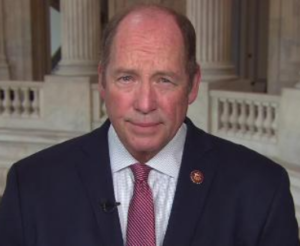By Jim Ellis
Dec. 12, 2019 — Keeping his pledge to serve only four terms in the House, Florida Rep. Ted Yoho (R-Gainesville) announced in a local radio interview earlier this week that he will not seek re-election next year. Also, the 2020 Texas candidate filing deadline came on Monday, and lists of the qualifying candidates are now becoming public.
REP. YOHO, FL-3

Florida Rep. Ted Yoho (R-Gainesville)
The eventual Republican nominee will clearly have the inside track to hold this seat for the GOP. Florida’s 3rd District is strongly, and consistently, Republican. President Trump scored 56.2 percent of the vote in 2016. This number is almost identical to the 56.6 percent that Mitt Romney posted against President Obama in 2012, and John McCain’s 54.6 percent that he garnered in the 2008 presidential election.
Rep. Yoho has averaged 61.0 percent of the vote here over four elections, but the district was significantly changed in the 2015 mid-decade court-ordered redistricting plan. In the current configuration, Yoho averaged almost exactly what the Republican presidential candidates scored: 57.2 percent in his two elections since the boundary alteration.
The 3rd District occupies five whole counties and parts of a sixth. The major population center is the city of Gainesville in Alachua County. The remaining portion of the CD is nestled squarely in the north/central section of the Florida peninsula.
Three Republicans had already announced their candidacies, but none seems particularly viable. The contender raising the most money through the Sept. 30 financial disclosure period is businesswoman Amy Pope Wells, but her receipts showed just under $40,000 raised for the campaign with a cash-on-hand figure of just under $8,500.
Three Democrats had also indicated they will run, but none are significant. The trio is comprised of frequent candidates who don’t run serious efforts. Now that Rep. Yoho has announced his intentions, we can expect to see competition forming in both parties.
TEXAS FILINGS
No surprises in the Senate and congressional races. Sen. John Cornyn (R) faces only token opposition, and all five of the more well-known candidates, former congressman and 2014 gubernatorial nominee Chris Bell, state Sen. Royce West (D-Dallas), Houston City Councilwoman Amanda Edwards, retired Army helicopter pilot and 2018 congressional candidate M.J. Hegar, and non-profit organization executive Cristina Tzintzun Ramirez, all filed as official candidates.
Looking at the congressional filings, 30 of the state’s 36 US House incumbents are running for re-election leaving hotly contested races in the primaries and some general elections. A total of 89 candidates from both parties filed to run in the six open Republican districts that stretch from the three lying throughout west Texas through the Dallas metro area into Waco and College Station, and then finally to the region south of Houston.
We can expect contested general elections in Districts 22 (Rep. Pete Olson retiring), 23 (Rep. Will Hurd), and 24 (Rep. Kenny Marchant), along with major multi-candidate Republican primaries in Districts 11 (Rep. Mike Conaway retiring), 13 (Rep. Mac Thornberry), and 17 (Rep. Bill Flores). In the 17th, former 32nd District Rep. Pete Sessions, who lost his Dallas-anchored seat in 2018, is returning to run in the Waco district where he was born and raised.
All 36 districts have candidates filing in both parties. Of the 30 incumbents seeking re-election, 17 have primary opponents. The most serious incumbent nomination challenge looks to be emanating from the Ft. Worth-anchored 12th District, where veteran Rep. Kay Granger (R-Ft. Worth) faces businessman and former Colleyville City councilman Chris Putnam. Originally filing with just under $500,000 in his account, it is possible that he could wage a $1 million-plus primary campaign.
The Texas primary will run concurrently with the Super Tuesday presidential primary on March 3. In any race, should no candidate secure majority support, the top two finishers will advance to a partisan run-off election on May 26.
The California filing deadline was last Friday, but the state extends the period an extra five days in races where the incumbents do not file. Therefore, we will see candidate lists being released in the next day or two.
